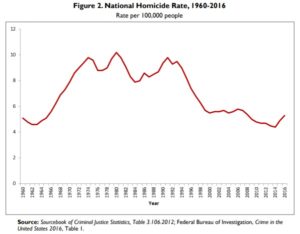 Sadly, America recently experienced several mass shootings in August of 2019 leaving 53 dead. How could this happen? Are video games to blame? What caused these recent mass shootings? Trump said that “Mental illness and hate pulled the trigger, not the gun.” But then he went on to, at least in part, blame video game violence for these shootings. In my first video, I address these topics, but read on below if you prefer!
Sadly, America recently experienced several mass shootings in August of 2019 leaving 53 dead. How could this happen? Are video games to blame? What caused these recent mass shootings? Trump said that “Mental illness and hate pulled the trigger, not the gun.” But then he went on to, at least in part, blame video game violence for these shootings. In my first video, I address these topics, but read on below if you prefer!
Does Video Game Violence Cause Mass Shootings?
I encourage you to read my Psychology Today blog and/or watch my video(s). The short answer is that, no, video game violence does not cause mass shootings. While they keep getting scapegoated, they are a red herring. There is no credible evidence that playing violent video games leads to acts of homicide, including mass shootings. People want answers though, and video game violence becomes an easy target. Now it has become a partisan issue. But we need to go where the data take us. Life is complicated, and there are not easy answers to these questions. Still, we CAN say that video game violence is not the culprit.
Interestingly, countries like Japan and South Korea have about as many gamers, percentage-wise, as the United States, yet they have about 1/25 of the homicide rate. Gamers, even when playing violent video games, cannot (and do not) kill people with their controllers. There are reasons we don’t hear about “mass knifings” and “mass bludgeonings.” Guns are part of the problem, but they are not the focus of this blog.
As further evidence against the “video game violence is to blame” idea, the U.S. rate has gone down significantly from where it was from 1970-1994. Thus, before there were any video games or when they violence depicted in them was primitive, the U.S. homicide rate was higher than it is today. If playing video games with violent content caused homicides, we would see a tremendous spike in societal violence, especially as the games became more graphically sophisticated. We just aren’t seeing that trend. Although the homicide rate has gone up in recent years, including mass shootings, the overall homicide rate is still far lower than it was decades ago.

Is Mental Illness to Blame for Mass Shootings?
Most people who suffer from any form of mental illness (e.g., depression, anxiety, ADHD, bipolar disorder) DO NOT commit acts of violence. However, to commit an act of atrocity such as a mass shooting, something, inherently, must be “wrong” with a person. I mean, who in his/her right mind would commit such an act of violence? We must remember that mass shootings, while tragic, only account for a small percentage of the deaths by guns in the U.S. For comparison, in 2016, there were 71 deaths by mass shootings, 14,415 homicides by gun, and almost 23,000 suicides by gun. There is definitely a link between depression and suicide, and suicides account for the largest number of deaths by gun. Better access to mental health care would likely reduce mass shootings, homicides, and suicides.
What About Hatred?
Hatred does seem to play a role in a number of mass shootings. For instance, the El Paso shooter and the New Zealand shooter both posted hate-filled, anti-immigrant, white supremacist manifestos prior to their acts of violence. But what’s behind the hate? Where does it come from? Gandhi said, “The enemy is fear. People think it is hate, but it is fear.”
Where Does the Fear Come From?
Fear is rooted in our evolutionary history. It is a primal emotion that has survival value. We needed to fear strangers and strange occurrences because they could pose threats to our life. Sure, they might be beneficial but, if they are not, we could be dead. Thus, fear is often the initial response to strangers. It is “hard-wired” into us, shaped by millions of years of evolution, to help us to survive. The trouble is, our current environment is very different from that of our hunter-gatherer ancestors. Over 99.999% of our evolutionary history was spent as nomadic hunter-gatherers in tribes of about 100-150. The “melting pot” of America is very, ahem, “foreign” to our brains. Arguably, one of the purposes of our existence is to overcome or transcend our evolutionary heritage and more primitive instincts.
The Politics of Fear
Do you remember the movie Wall Street with Michael Douglas and Charlie Sheen? Michael Douglas plays Wall Street tycoon Gordon Gecko, who famously proclaimed to an audience of business people, “Greed is good. Greed works.” Politicians trying to win votes and get people to back them might echo these sentiments, although never publicly, by noting, “Fear works.”
Fear is such a primal emotion. It helped our ancestors avoid danger and survive. It’s relatively easy for politicians and advertisers to capitalize on this primitive emotion to motivate people to support them, vote, and/or buy their product. “There are invaders trying to take over our country! We must stop them because they want to take our jobs, rape our women, and kill us! Vote for me, and I promise that I’ll protect you from these invaders!” Politicians on the left my say, “Vote for me, and I’ll protect your from this lunatic!” It’s not a right/left thing. If you want to get elected, eliciting fear and offering you/your policies as the solution is a proven way to get elected.
From our evolutionary heritage, we have a tendency to fear others. We evolved in small, hunter-gatherer tribes who were nomadic. Strangers could be danger! Sure, they might be friendly but, if they are not, we could be dead! So, our ancestors evolved to have a fear of others first. Who was “the other?” Anyone who wasn’t in our tribe. But now our tribe is a melting pot. Our world is very different from our ancestors yet some of these primal emotional responses are very difficult to overcome. Just watch a college football rivalry to see modern tribalism in action!
What Do We Do About It?
I am inspired by advice from the Dalai Lama in his book, The Art of Happiness. In order to transcend some of the trappings of our evolutionary heritage, it can be helpful to look at how we are the same as others instead of focusing on our differences. For starters, we all want to be happy and don’t want to suffer. We all have the same emotions such as love, joy, anger, fear, sadness, and pride. We care about our friends and family members and want them to thrive. When it comes down to it, we are more alike than different. When we focus on our similarities, this can break down the walls that divide us. Then “other” is no longer “other.” When this happens, fear and hatred dissipate. I know, it’s easier said than done. However, if we make it a daily practice to reach out to others who are different than us, we will realize the truth that they aren’t so different after all.
